When it comes to promoting your indie game or studio, B2B trade shows can be a goldmine of opportunities. But how do you determine if attending one is truly worth your time, effort, and money? The decision goes beyond simply buying a ticker or booking a booth, you also need to consider the value the event can bring to your studio.
Trade shows offer a range of benefits, from networking with industry professionals and potential investors to learning from peers and experts. You can also grow your contact list, meet with publishers, and showcase your game to new potential players.
B2B VS B2C trade shows
When deciding which trade shows to attend, it’s crucial to distinguish between B2B (Business-to-Business) and B2C (Business-to-Consumer) events. Each type serves a unique purpose and targets a different audience.
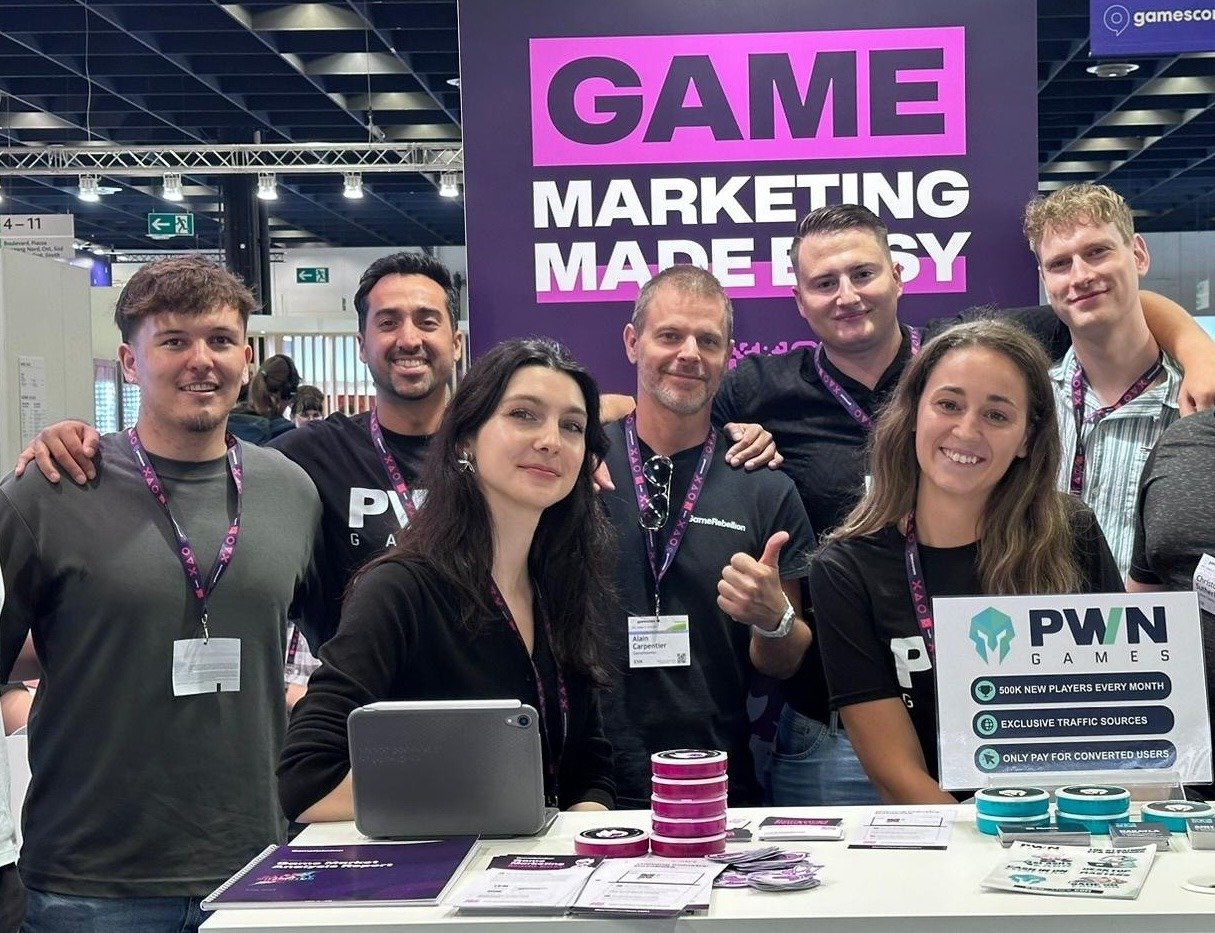 Our GameRebellion, Elusive and PWNGames teams attending Gamescom 2024.
Our GameRebellion, Elusive and PWNGames teams attending Gamescom 2024.
B2B trade shows are industry-specific events where companies showcase their products or services to other businesses, rather than to individual consumers. They help indie game studios network with potential partners, investors, and publishers to bring their games to market. There, you can pitch to distributors, negotiate deals, and access the latest tools and technologies to improve your game development or monetization. These events also provide valuable insights through panels and presentations, helping you stay ahead of industry trends.
In contrast, B2C trade shows focus on engaging directly with players, creating buzz and excitement around new game releases. These events allow indie studios to showcase their games, gather immediate feedback, and grow a fanbase through direct interactions. They also attract media attention, bringing in journalists, influencers, and content creators who can boost your game’s visibility. If you’re preparing for a launch, B2C shows are great for building momentum and gathering a community around your game.
Ultimately, choosing the right type of trade show depends on your goals. If you’re seeking partnerships, investment, or strategic resources, B2B trade shows should be your focus.
Find the best gaming trade show
A detailed comparison of events will help you understand key factors like location, costs, and attendee demographics, keeping in mind that the events mentioned are mostly B2B oriented.
When it comes to networking for indie studios, Gamescom, GDC, ChinaJoy, Tokyo Games Show, and MIGS stand out as prime opportunities to connect with industry professionals, investors, and publishers.
For those looking to make waves on the international stage, areas like Gamescom Business Area and Tokyo Game Show Business Days provide unparalleled global exposure and access to key business circles.
Set Clear Goals and Objectives
Before attending a trade show, you need to define your goals. What do you hope to achieve by attending? Your objectives will shape how you prepare yourself and the kind of return on investment you can expect.
Are you attending simply as a participant to scope out the competition, learn from industry experts, and network? Or are you planning to have a booth and showcase your game to potential partners, publishers, or investors?
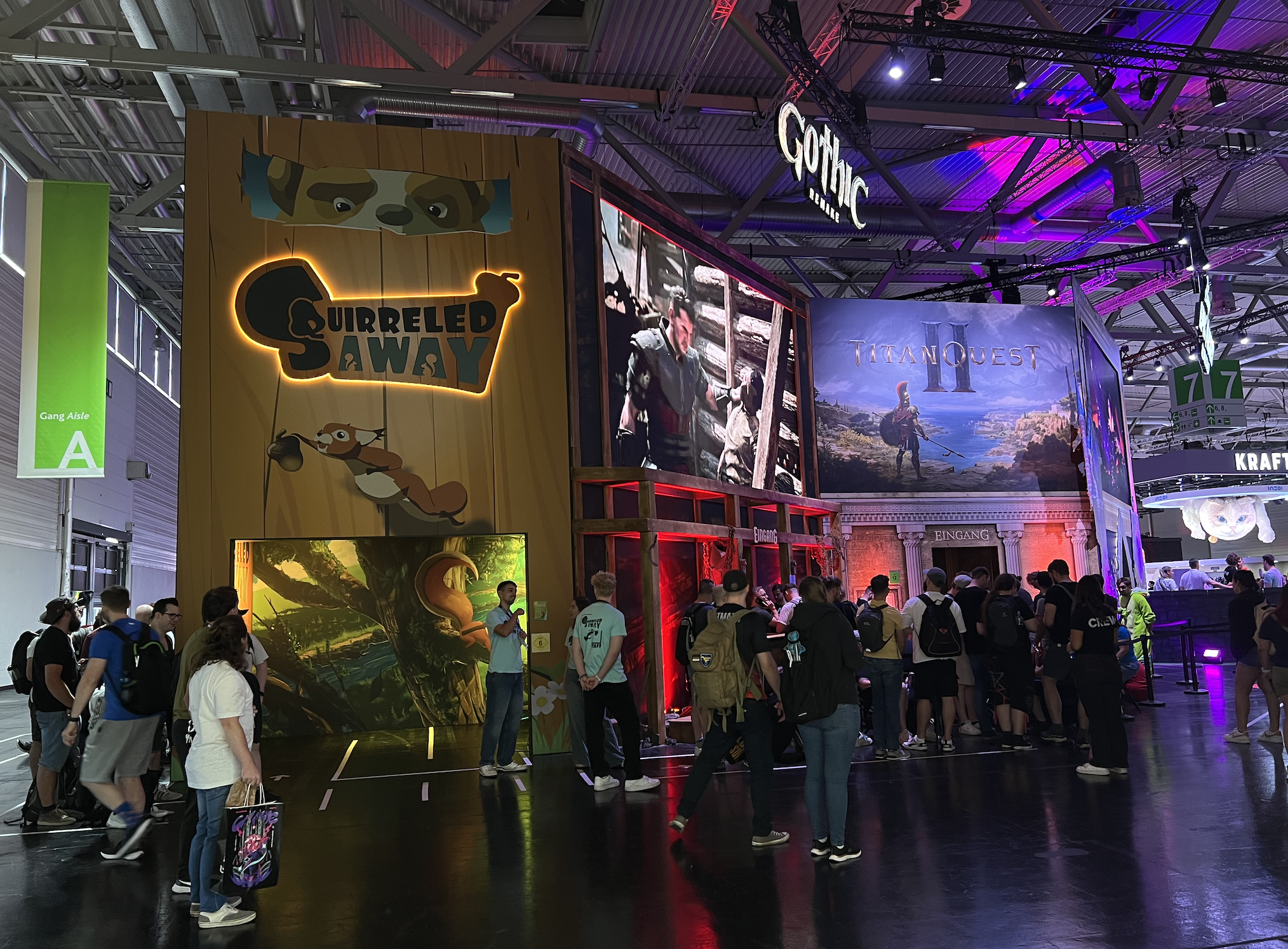 Gamescom 2024 - Main alleyways and multiple booths - Photo taken by GameRebellion
Gamescom 2024 - Main alleyways and multiple booths - Photo taken by GameRebellion
Your goals could range from building visibility and brand awareness to securing valuable partnerships or gathering player feedback. Keep in mind that each objective will have its own set of Key Performance Indicators (KPIs) to measure success.
One of the biggest pitfalls is setting too ambitious goals and feeling let down when they are unmet. For example, aiming to get 10,000 newsletter sign-ups at an event with fewer than 5,000 attendees is both counterproductive and unrealistic.
What goals should you set?
You need to define the KPIs that matter most to the current stage of your game development. The type of events you’ll choose will largely depend on them.
Choose metrics that align with your B2B objectives, whether it is boosting awareness, driving engagement, or forging connections with potential business partners and industry stakeholders.
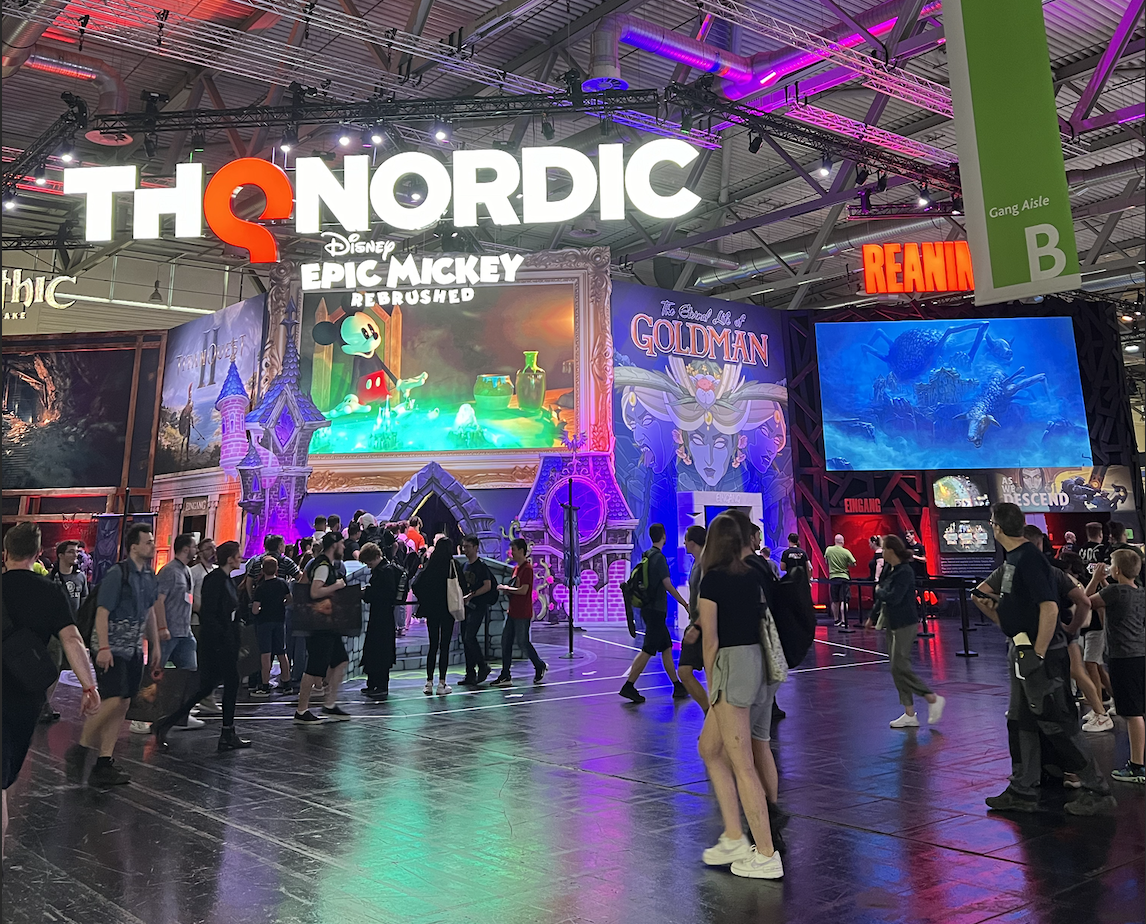 Gamescom 2024 - THQ Nordic booth - Photo taken by GameRebellion
Gamescom 2024 - THQ Nordic booth - Photo taken by GameRebellion
For example, if your goal is to network, your KPIs might include the number of new business contacts made or the number of follow-up meetings secured after the event.
If you’re aiming to generate leads, track the number of qualified leads collected and the percentage of those leads that convert into active business discussions within 30 days. If your goal is to stay ahead of industry trends, measure success by the number of panels or workshops attended and the actionable insights gained from those sessions.
Choose the Best Gaming Events Using Data
With clear goals in place, the next step is to strategically select the right gaming events to showcase your game. Don’t waste time and resources attending any random trade show — research events that align with your game’s objectives and reach your ideal target audience.
Start by focusing on where your audience will be. Does your game have a unique regional appeal or receive local funding support? Prioritize events that highlight those connections and provide a platform to engage with the right crowd.
Leverage data-driven insights to guide your decision. Analyze attendee demographics, past event success stories, and media coverage to ensure your game gets the exposure it needs to thrive. For example, the data in the graph below shows that 72% of attendees are between the ages of 9 and 24 — a critical demographic for studios targeting younger gamers.
For developers creating games for younger audiences, Gamescom could be the ideal event to generate buzz and build a loyal fanbase. By tapping into the interests of a demographic eager for fresh and exciting gaming experiences, your studio can maximize engagement and make a lasting impact.
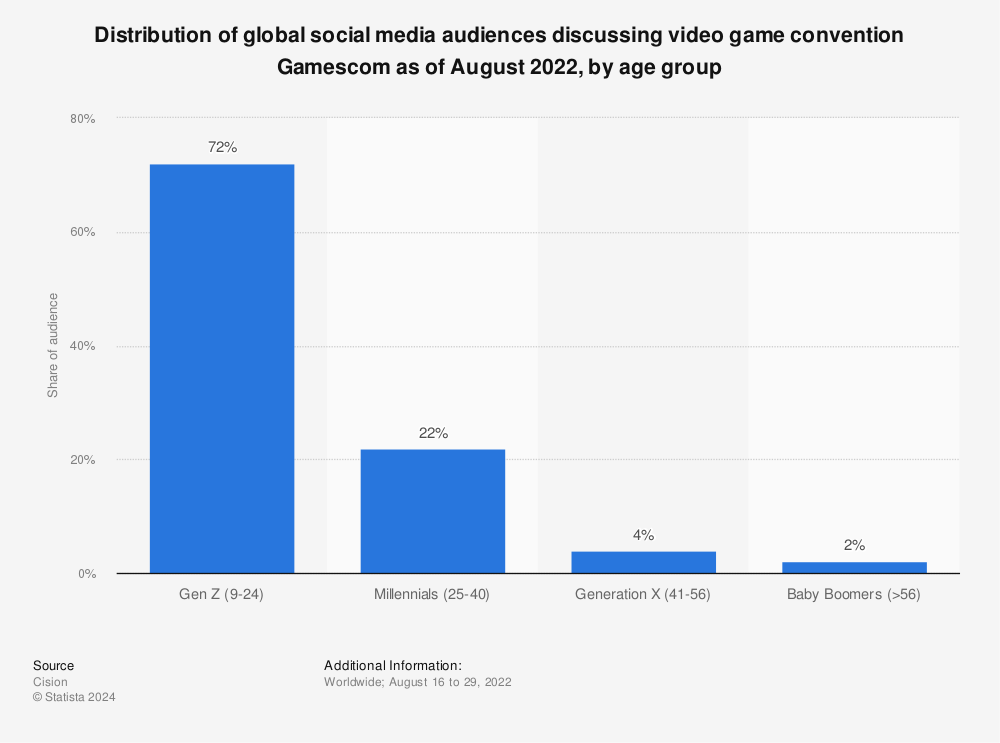
Published in 2022 on Statista by Cision, Distribution of global social media audience discussing video game convention Gamescom as of August 2022, by age group.
With 31,000 of Gamescom’s 320,000 visitors being trade professionals, including 4.4% who are publishers, it’s clear that this event offers a golden opportunity for studios targeting younger audiences. The gaming industry is increasingly driven by Gen-Z, who are becoming a dominant force in the market, and Gamescom is the perfect platform to connect with them.
To secure publishing deals and partnerships, studios need a well-prepared and adaptable pitch that speaks directly to the needs and preferences of this younger demographic.
What resonates with Gen-Z won’t necessarily connect with Millennials or Gen X, so it’s essential to tailor your approach. Having the right data allows you to fine-tune your approach for maximum impact.
Country Delegations at B2B Events
Country delegations also attend major B2B gaming trade shows like GDC, Gamescom, and Nordic Games and offer smaller studios essential visibility, support, and connections that they might struggle to achieve alone.
Organized by governments or trade bodies, these delegations give indie studios the chance to showcase their games on a larger stage, under the banner of their nation.
By joining a delegation, indie developers gain access to resources, connections, and industry recognition that can be difficult to achieve alone.
Delegations offer logistical and financial support (such as booth space, marketing materials, or even travel expenses), along with pre-arranged meetings with key industry players, and a collective presence that draws the attention of publishers and investors.
This support not only boosts your studio’s visibility but also lends credibility, signalling that your studio is recognized and backed by your country.
This kind of endorsement can propel you and your studio onto the international stage, opening doors to new opportunities (new partners, publisher deals, funding opportunities, and so on.)
Governments or trade bodies also typically promote their delegation members through official channels like newsletters, social media, or event websites.
This additional exposure, both before and during the event, raises the profile of indie studios and boosts their chances of being noticed by industry leaders.
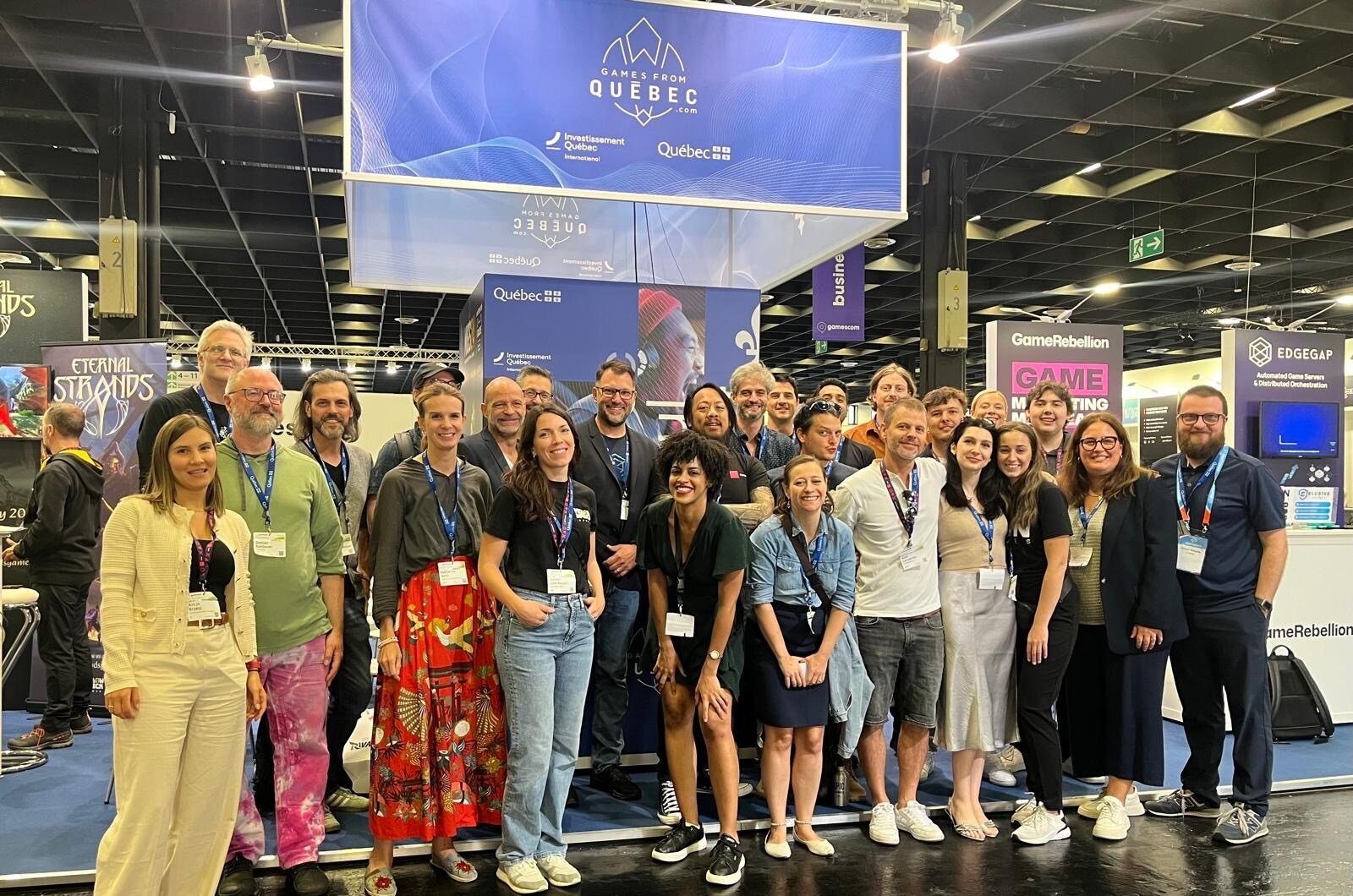 Our GameRebellion team at Quebec Delegation booth - Gamescom 2024
Our GameRebellion team at Quebec Delegation booth - Gamescom 2024
By sponsoring workshops, panels, and discussions, they provide indie studios with direct access to invaluable insights on the latest industry trends, cutting-edge technologies, and best practices. More than just passive participants, delegations advocate for their studios, paving the way for high-level discussions and crucial partnerships that can transform a studio’s trajectory.
If you’re heading to a major trade show, make sure to connect with your country’s delegation. They’re often involved, and this could be your ticket to industry recognition and lasting success!
Evaluate Your Readiness: Is Your Studio Prepared for the Spotlight?
Before you pack your bags and polish your pitch, ask yourself—do you have everything you need to make the most of this event? Attending a trade show or game convention is a significant investment of time, energy, and resources. Let’s break down the key factors to ensure you’re not just showing up, but setting yourself up for success.
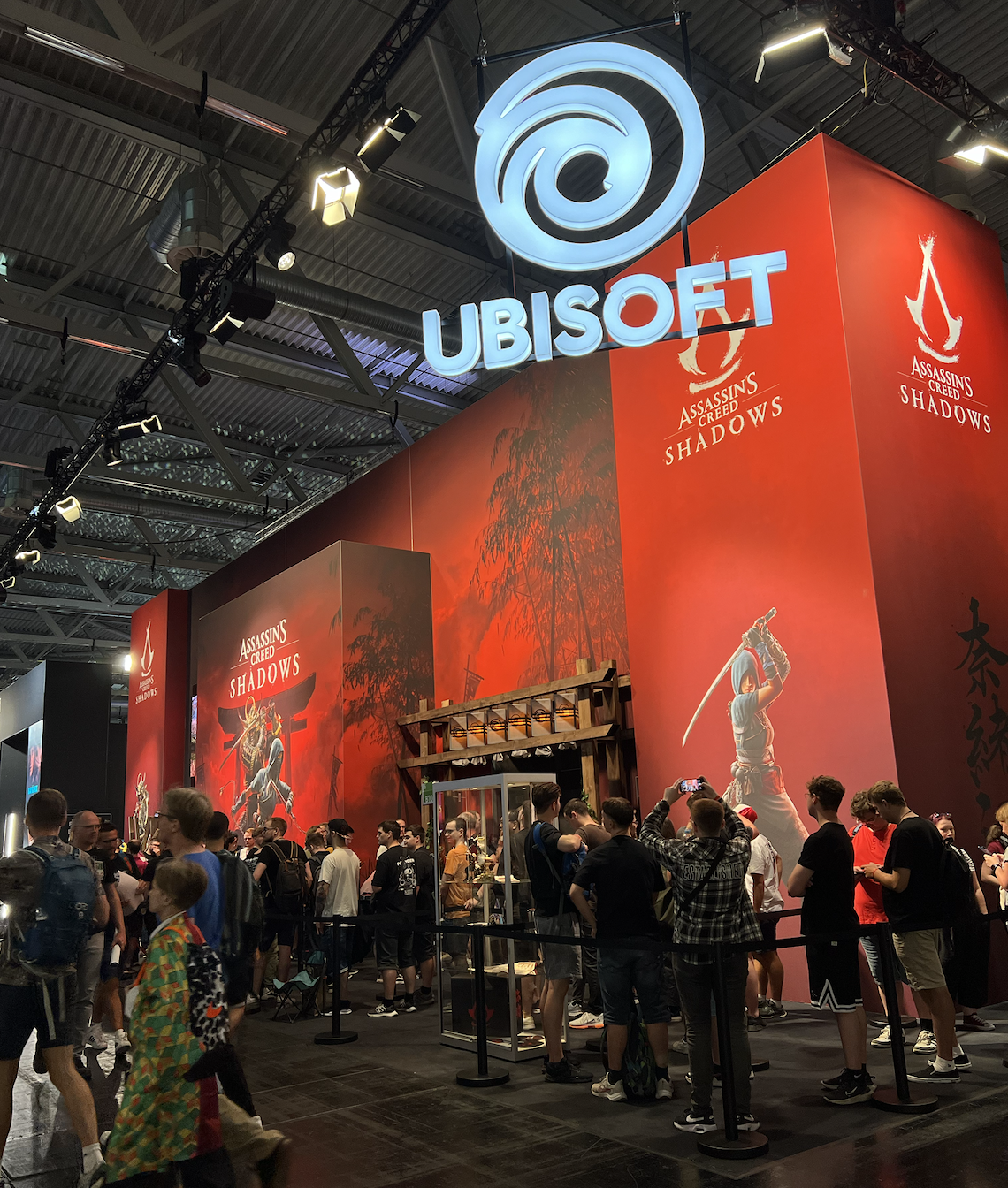
Is your budget on point?
First thing first: finances. Can your studio comfortably afford the cost of attendance? Booth space, travel, accommodation, and promotional materials can quickly add up. If you’re working with a tight budget, will this event push your finances to the brink?
While exposure is valuable, it shouldn’t come at the cost of jeopardizing other crucial marketing efforts. Smart financial planning ensures that attending an event is a strategic move, not a desperate gamble.
Logistics: smooth sailing or rocky roads?
Now, let’s talk logistics. Are you and your team ready to hit the road? If the event is a long journey away, will the travel be manageable, or will it drain your team before the real work even begins?
And speaking of your team, have you assembled the right crew? Your booth needs more than just warm bodies; it needs a mix of experts who can pitch your game, solve technical issues on the fly, and engage attendees with enthusiasm.
Don’t forget the essentials: merch, business cards, flyers, a demo of your game ready to play and eye-catching booth designs.
Most importantly, have your pitch deck ready! A well-prepared pitch deck is needed and will give potential partners, investors, or publishers a clear and concise overview of your game, your studio, and your business goals.
Make sure it highlights the main aspects, such as your game’s unique selling points, your target audience, the development timeline, and any funding or partnership needs. A polished pitch deck can make all the difference in turning a casual conversation into a serious business opportunity.
Networking strategy: meetings lined up?
Trade shows are gold mines for connections if you know how to dig. Have you scheduled meetings with industry professionals, potential collaborators, or media contacts? Platforms like MeetToMatch can help you arrange face-to-face time with the right people.
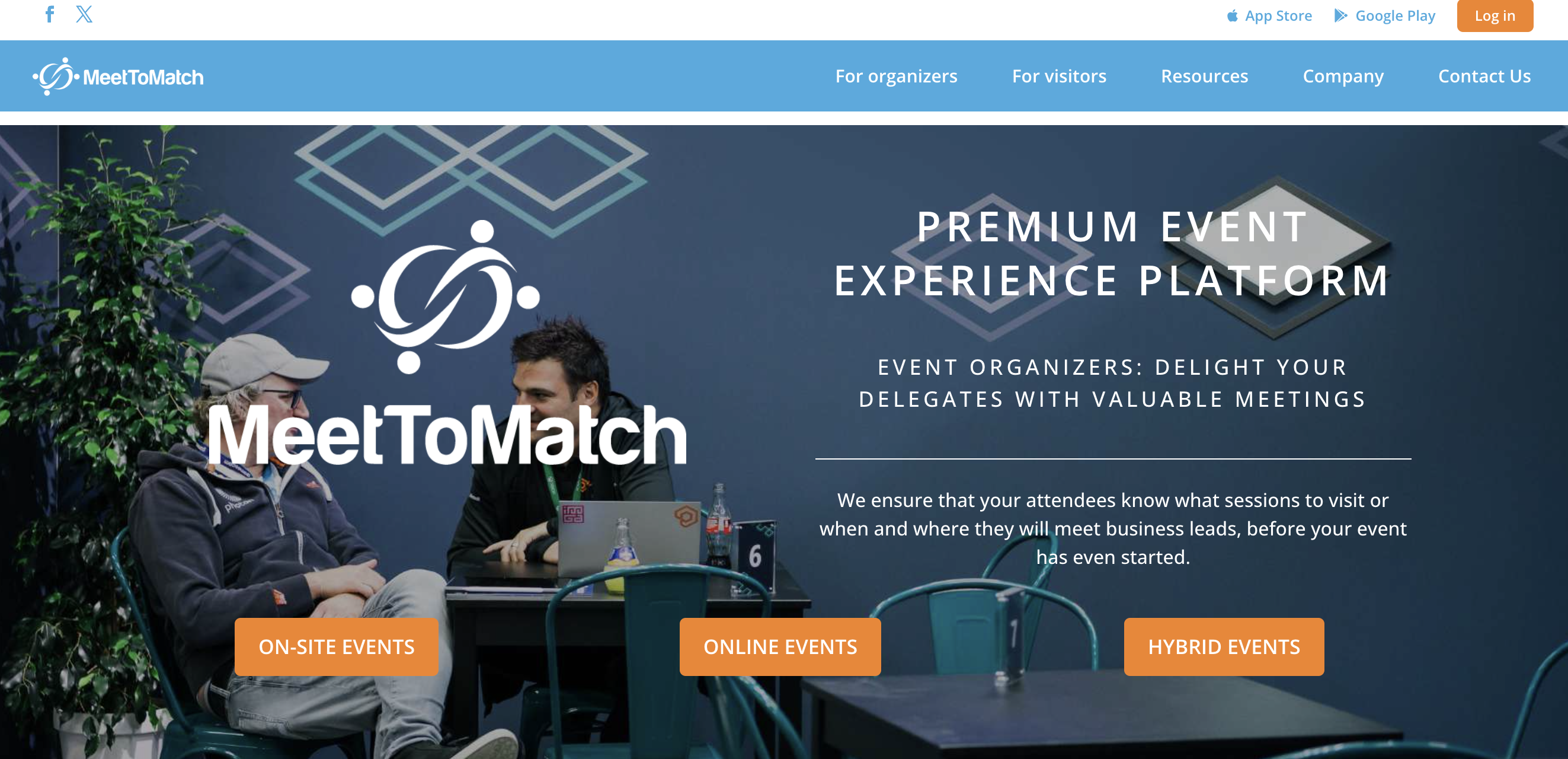 Image from MeetToMatch official website.
Image from MeetToMatch official website.
Don’t wait until you’re there to start networking. Have a plan that goes beyond just standing at your booth and makes the event work for you.
Learn from Others’ Successes and Failures
To ensure a successful B2B event, one of the best ways to prepare is by learning from the successes and failures of those who came before you. Understanding what fosters meaningful connections, avoiding common pitfalls, and knowing what it takes to be seen as a success can give your indie studio the edge it needs for long-term growth.
GamesBeat Summit 2021 – The Pandemic’s Curse
Due to the ongoing COVID-19 pandemic, GamesBeat Summit 2021 transitioned to a fully virtual format to prioritize attendee safety and meet health regulations. However, this shift exposed the limitations of online platforms for B2B events, where in-person networking, spontaneous conversations, and face-to-face interactions are what build meaningful business relationships.
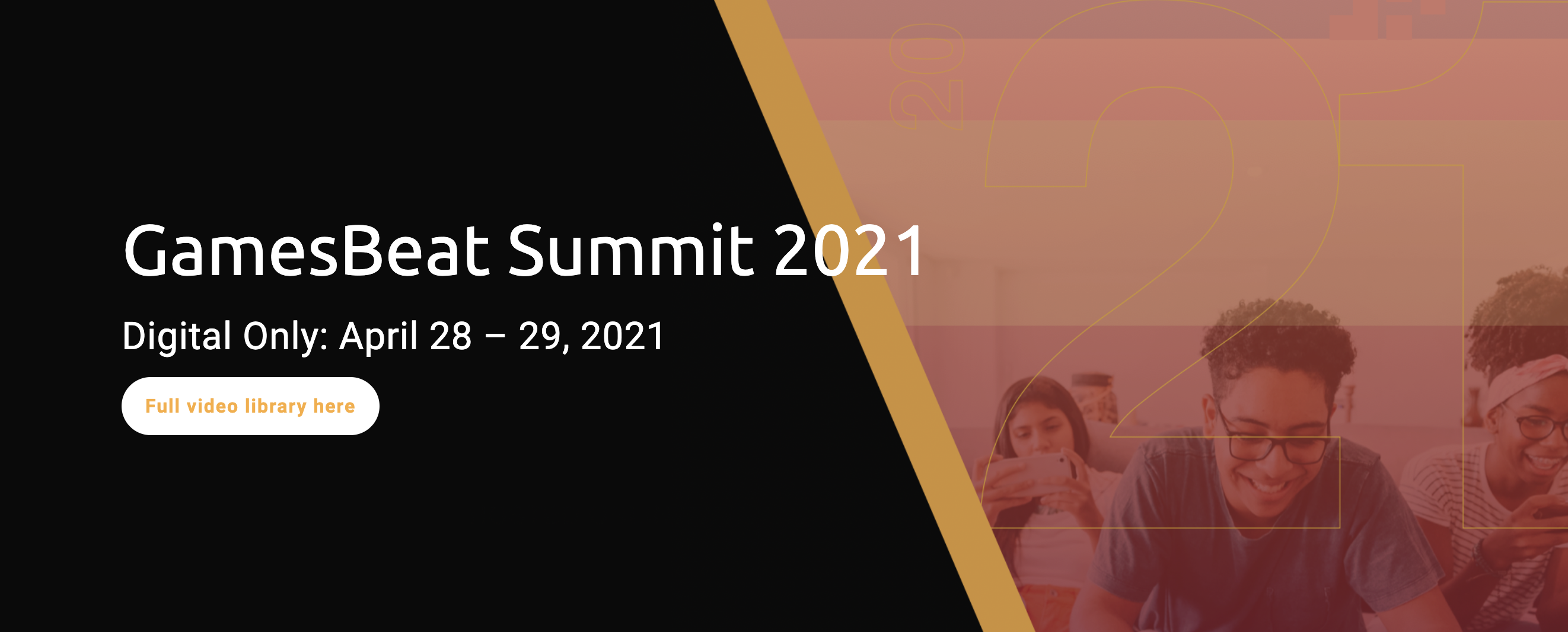 Image from GamesBeat Summit 2021 official website.
Image from GamesBeat Summit 2021 official website.
Traditionally, the summit catered to senior gaming executives, providing a prime setting for high-level discussions, networking, and deal-making. However, the virtual format in 2021 left many attendees disappointed.
The lack of in-person networking was a major drawback. Events like this thrive on organic interactions, casual hallway chats, impromptu meetings, and natural networking opportunities. While the virtual platform worked well for presentations, it fell short in creating those essential personal connections.
Game marketing agencies and development studios attended, hoping to secure partnerships and clients, but struggled to build relationships through the virtual meetings. Unlike previous in-person editions, where casual networking often led to unexpected opportunities, the rigid structure of online sessions left many attendees without the business deals they had anticipated.
Learning from Mistakes
Despite the struggles of the 2021 edition, GamesBeat learned from the feedback and made significant improvements in subsequent years. The 2023 edition received glowing reviews, with many praising the return of effective networking, in-person attendance, and the renewed energy of the event. The 2024 edition is now back on track, with a strong focus on fostering meaningful connections and delivering the value that B2B attendees expect. It’s clear that the event has bounced back, offering a much-improved experience for participants.
Gamescom (Cologne, Germany) – A Consistent Success
Gamescom, one of the world’s largest gaming events, expertly blends B2B and B2C elements. Its dedicated business area has become a central hub for developers, publishers, and service providers to secure partnerships and distribution deals.
What sets Gamescom apart is its ability to attract a diverse range of professionals, from indie studios to major publishers.
The hybrid nature of Gamescom, with its unique blend of B2B and B2C experiences, offers exhibitors the perfect platform to engage both industry professionals and consumers, expanding networks while generating buzz.
For example, DEVCOM, which takes place just before Gamescom at the same venue, provides an invaluable chance to meet and learn from industry leaders.
Moreover, there is two massive B2B zones, dedicated business area to facilitate top-tier networking with key industry decision-makers.
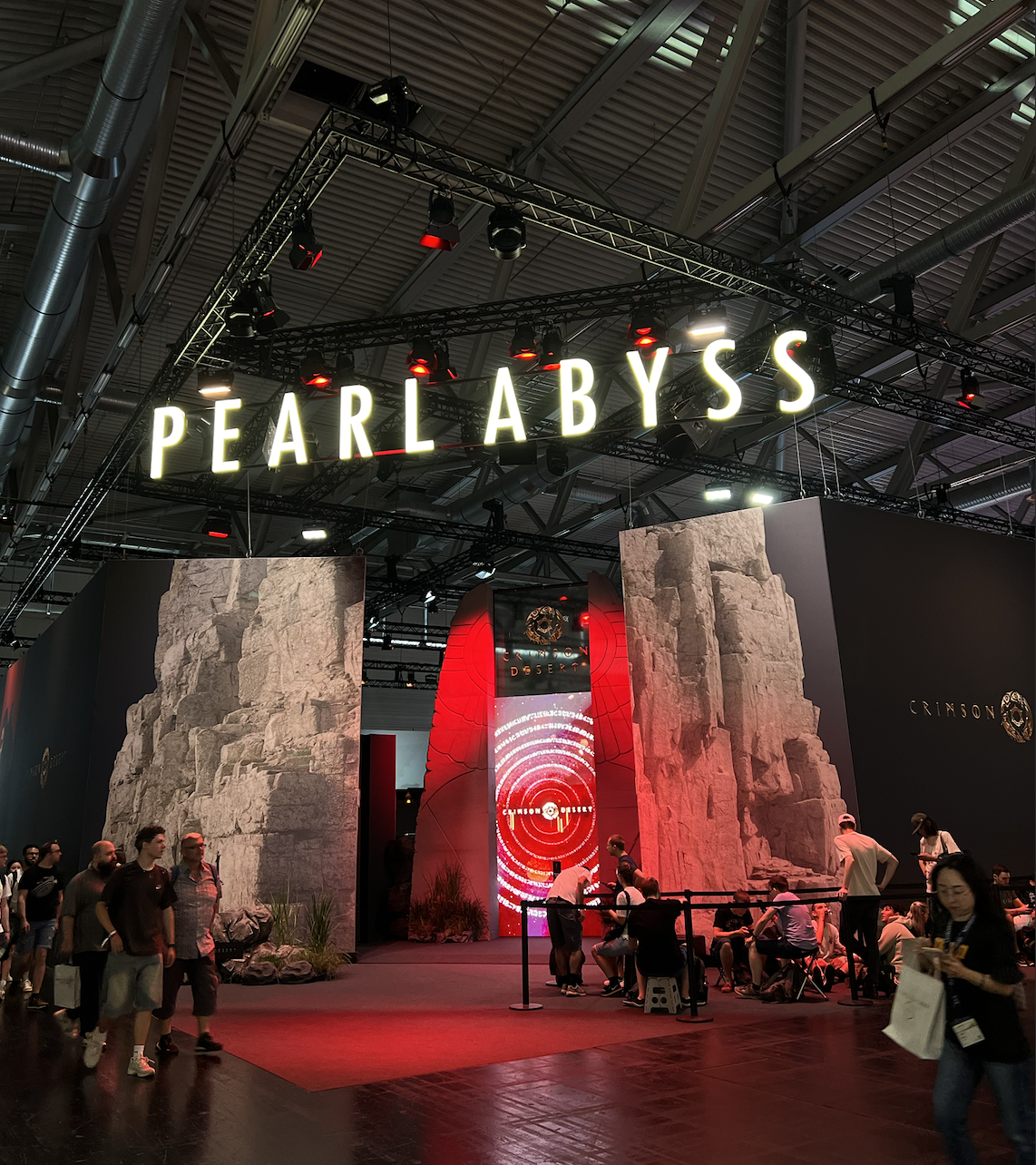 Gamescom 2024 - Pearl Abyss Booth - Photo taken by GameRebellion
Gamescom 2024 - Pearl Abyss Booth - Photo taken by GameRebellion
Developers and publishers frequently secure major deals and expand their networks. Indie developers, in particular, benefit from exposure, often landing new publishing or distribution agreements.
Gamescom has grown over the years to become an industry pillar, Like E3 was before it, and it is now regarded as a place to grow market reach and build strong relationships for industry professionals.
GDC (Game Developers Conference, San Francisco, USA) – Steady Triumph in Gaming
GDC is one of the most prestigious B2B gaming events, drawing developers, publishers, investors, and tech companies from around the globe. The event itself is huge and has steadily improved over the years to become one of the most anticipated events of the year.
At GDC, you’ll have the opportunity to network, explore new business opportunities, and gain valuable industry insights from expert panels. Renowned for its educational focus, GDC delivers cutting-edge talks that offer actionable insights on the latest trends, technology, and innovations.
Indie developers regularly meet publishers and investors at GDC, often securing funding and partnerships. Tech companies also use the event to showcase tools and software, leading to deals with developers looking to streamline production.
MIGS (Montreal International Game Summit, Canada) – An On-Going Growth
MIGS stands out as another top-tier event for developers and business professionals, especially in North America. It places a strong emphasis on professional networking, making it a prime destination for B2B relationships between North American and European markets.
With its more focused and intimate atmosphere, MIGS encourage deep discussions and long-term business collaborations between associations, studios, publishers and other industry experts. This is the event to be at if you are working in the area!
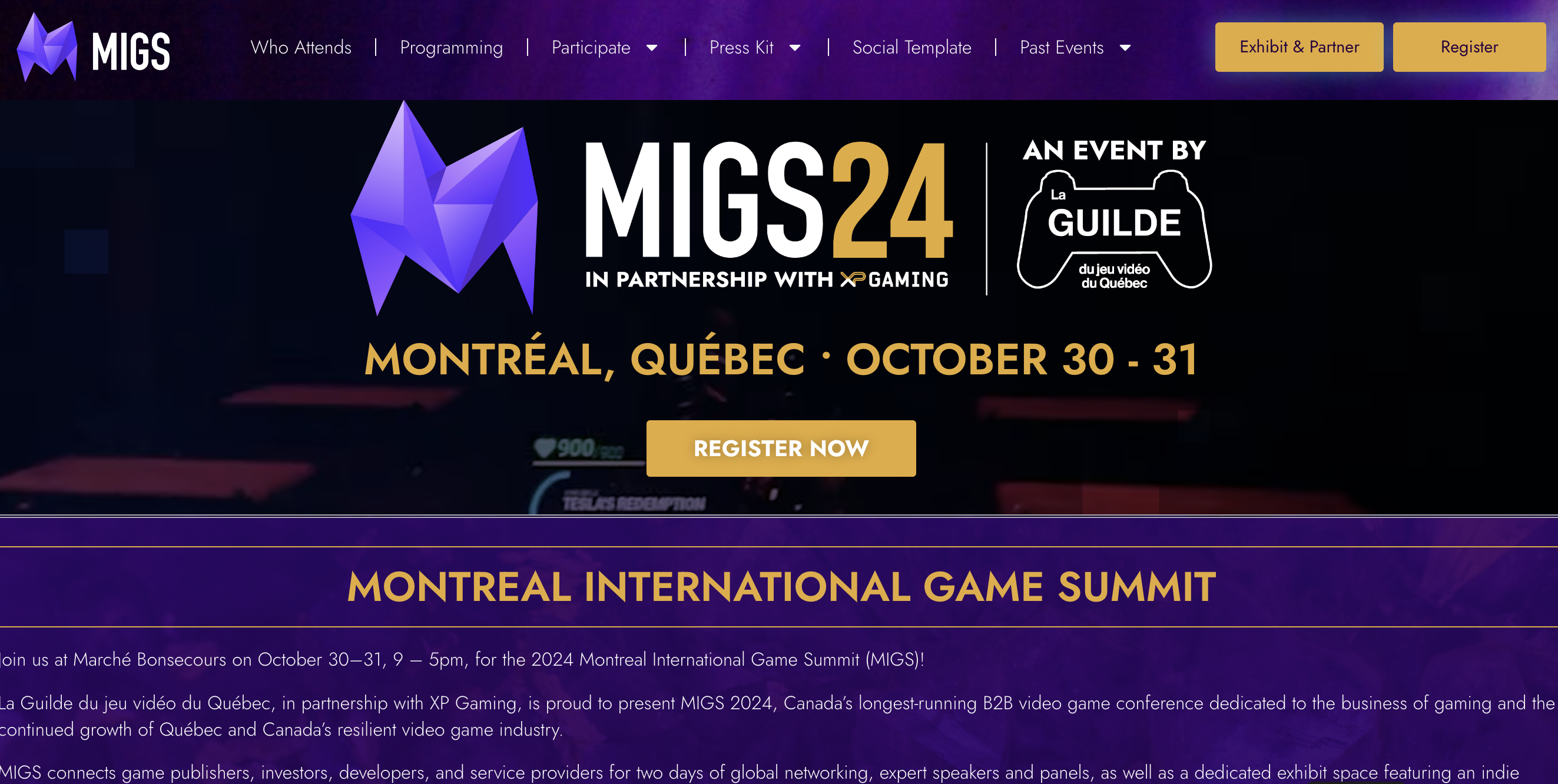 MIGS 2024 - Official event website
MIGS 2024 - Official event website
MIGS attendees frequently leave with new partnerships, particularly between developers and publishers. Its smaller scale allows for more personalized connections, and its educational panels help developers position their studios for future success (think, marketing, positioning, monetization, everything we usually explore in our blog!)
So, what are you waiting for? Choose the event that aligns with your goals and get ready with a rock-solid plan, pitch, and booth strategy to stand out, make lasting connections, and collaborate with industry leaders and experts. This is your chance to make the most of those events — don’t miss it!
Our Quick Networking Tips: Turning Conversations Into Opportunities
At trade shows, real value often lies in the connections you make, but turning brief encounters into strong business connections requires a bit of planning.
To ensure your interactions with investors and publishers leave a lasting impact, focus on these key steps:
- Pre-schedule meetings: Lock in time with key investors or publishers ahead of the event to guarantee meaningful, focused discussions without distractions. This will also remove some of the stress of having a worthwhile trade show and ensure you get to meet the people you are interested in!
- Deliver a neat pitch: Create a powerful, concise pitch that showcases your game’s unique strengths. This will make a lasting impression on publishers, investors, and anyone who drops by your booth. You never know who you might meet!
- Leave a lasting reminder: Distribute materials like business cards or game sheets to keep your game top of mind after the meeting. Depending on your budget, you can also consider different types of merch and leave-behinds (stickers, magnets, posters, and flyers are usually working !).
- Engage and listen: Foster authentic connections by actively listening and responding to the specific needs and interests of your audience. A potential publisher enquires about your development step, and it might be time to deviate from your classic pitch and get into the nitty gritty of your process.
- Follow up thoughtfully: Reach out within 48-72 hours with a personalized follow-up to reinforce the relationship you have met and keep the momentum going. If you noticed something memorable during your interaction, feel free to start the conversation with a relevant anecdote to reignite the connection
- Nurture relationships: Stay on their radar by providing regular updates and maintaining communication for future opportunities. If you have set up an email list for pre-orders or newsletters, this is the perfect way to reach out to those you have met!
Prepare ahead, engage genuinely, and nurture your connections long after the event, to transform whatever brief interactions into lasting partnerships.
Approaching the events this way makes sure that every conversation becomes more than just an exchange, it ensures that each interaction builds lasting relationships, creates opportunities for collaboration, and opens doors to future partnerships.
If you're looking for tailored strategies to take your game marketing to the next level, we’re ready to help you stand out. Want to see how we can make your next event a success? Find out here.









